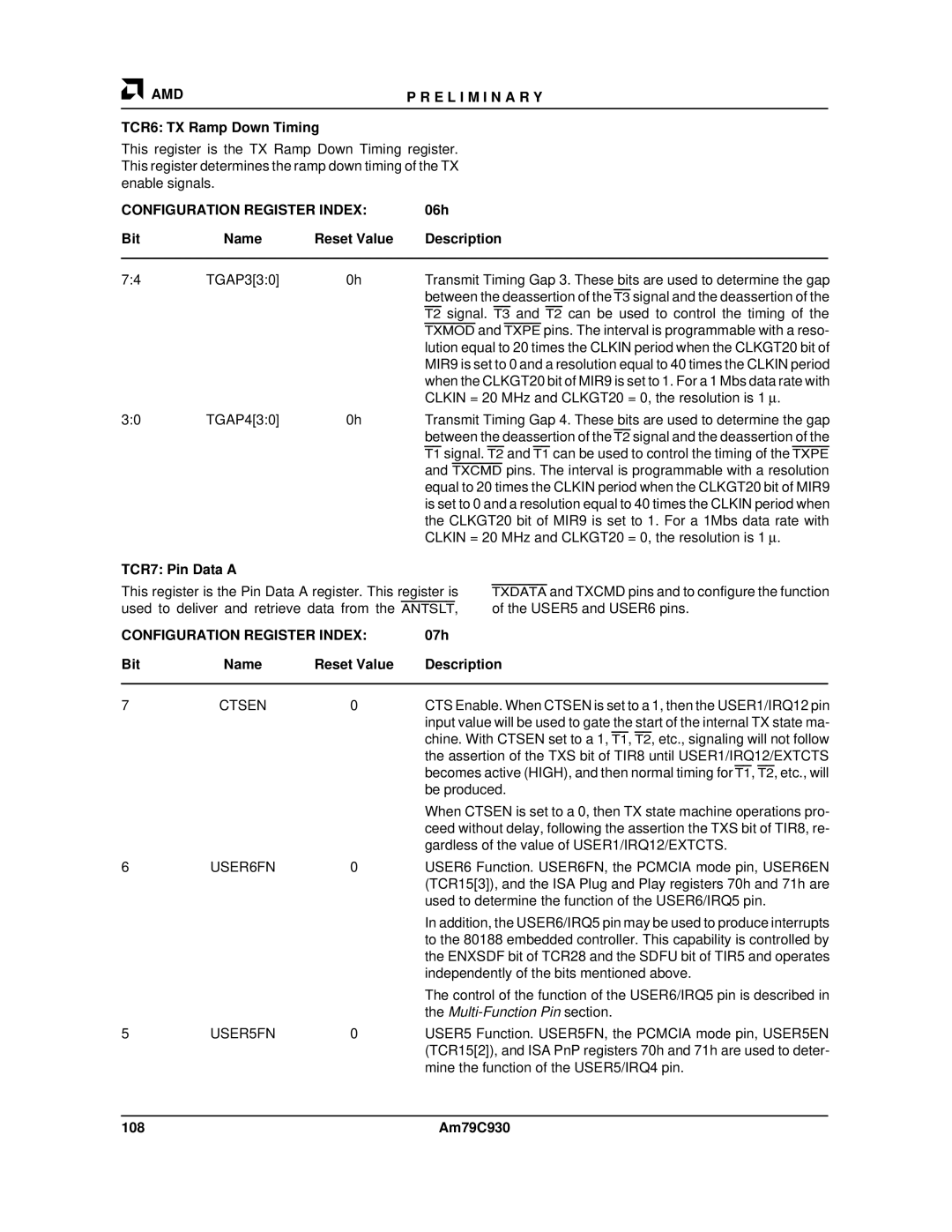AMD | P R E L I M I N A R Y |
|
|
TCR6: TX Ramp Down Timing
This register is the TX Ramp Down Timing register. This register determines the ramp down timing of the TX enable signals.
CONFIGURATION REGISTER INDEX: | 06h | |||
Bit | Name | Reset Value | Description | |
|
|
|
|
|
7:4 | TGAP3[3:0] | 0h | Transmit Timing Gap 3. These bits are used to determine the gap | |
|
|
| between the deassertion of the T3 signal and the deassertion of the | |
|
|
| T2 signal. T3 and T2 can be used to control the timing of the | |
|
|
| TXMOD and TXPE pins. The interval is programmable with a reso- | |
|
|
| lution equal to 20 times the CLKIN period when the CLKGT20 bit of | |
|
|
| MIR9 is set to 0 and a resolution equal to 40 times the CLKIN period | |
|
|
| when the CLKGT20 bit of MIR9 is set to 1. For a 1 Mbs data rate with | |
|
|
| CLKIN = 20 MHz and CLKGT20 = 0, the resolution is 1 μ. | |
3:0 | TGAP4[3:0] | 0h | Transmit Timing Gap 4. These bits are used to determine the gap | |
|
|
| between the deassertion of the T2 signal and the deassertion of the | |
|
|
| T1 signal. T2 and T1 can be used to control the timing of the TXPE | |
|
|
| and TXCMD pins. The interval is programmable with a resolution | |
|
|
| equal to 20 times the CLKIN period when the CLKGT20 bit of MIR9 | |
is set to 0 and a resolution equal to 40 times the CLKIN period when the CLKGT20 bit of MIR9 is set to 1. For a 1Mbs data rate with CLKIN = 20 MHz and CLKGT20 = 0, the resolution is 1 μ.
TCR7: Pin Data A
This register is the Pin Data A register. This register is used to deliver and retrieve data from the ANTSLT,
TXDATA and TXCMD pins and to configure the function of the USER5 and USER6 pins.
CONFIGURATION REGISTER INDEX: | 07h | |||
Bit | Name | Reset Value | Description | |
|
|
|
|
|
7 | CTSEN | 0 | CTS Enable. When CTSEN is set to a 1, then the USER1/IRQ12 pin | |
|
|
| input value will be used to gate the start of the internal TX state ma- | |
|
|
| chine. With CTSEN set to a 1, T1, T2, etc., signaling will not follow | |
|
|
| the assertion of the TXS bit of TIR8 until USER1/IRQ12/EXTCTS | |
|
|
| becomes active (HIGH), and then normal timing for T1, T2, etc., will | |
|
|
| be produced. | |
|
|
| When CTSEN is set to a 0, then TX state machine operations pro- | |
|
|
| ceed without delay, following the assertion the TXS bit of TIR8, re- | |
|
|
| gardless of the value of USER1/IRQ12/EXTCTS. | |
6 | USER6FN | 0 | USER6 Function. USER6FN, the PCMCIA mode pin, USER6EN | |
|
|
| (TCR15[3]), and the ISA Plug and Play registers 70h and 71h are | |
|
|
| used to determine the function of the USER6/IRQ5 pin. | |
|
|
| In addition, the USER6/IRQ5 pin may be used to produce interrupts | |
|
|
| to the 80188 embedded controller. This capability is controlled by | |
|
|
| the ENXSDF bit of TCR28 and the SDFU bit of TIR5 and operates | |
|
|
| independently of the bits mentioned above. | |
|
|
| The control of the function of the USER6/IRQ5 pin is described in | |
|
|
| the | |
5 | USER5FN | 0 | USER5 Function. USER5FN, the PCMCIA mode pin, USER5EN | |
|
|
| (TCR15[2]), and ISA PnP registers 70h and 71h are used to deter- | |
|
|
| mine the function of the USER5/IRQ4 pin. | |
|
|
|
|
|
108 |
|
| Am79C930 | |
